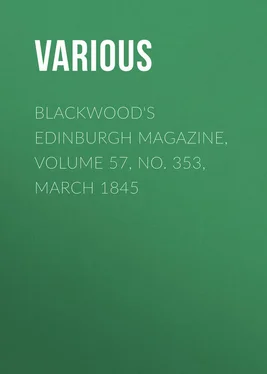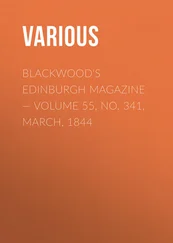Various - Blackwood's Edinburgh Magazine, Volume 57, No. 353, March 1845
Здесь есть возможность читать онлайн «Various - Blackwood's Edinburgh Magazine, Volume 57, No. 353, March 1845» — ознакомительный отрывок электронной книги совершенно бесплатно, а после прочтения отрывка купить полную версию. В некоторых случаях можно слушать аудио, скачать через торрент в формате fb2 и присутствует краткое содержание. Издательство: Иностранный паблик, Жанр: periodic, foreign_edu, Путешествия и география, на английском языке. Описание произведения, (предисловие) а так же отзывы посетителей доступны на портале библиотеки ЛибКат.
- Название:Blackwood's Edinburgh Magazine, Volume 57, No. 353, March 1845
- Автор:
- Издательство:Иностранный паблик
- Жанр:
- Год:неизвестен
- ISBN:нет данных
- Рейтинг книги:5 / 5. Голосов: 1
-
Избранное:Добавить в избранное
- Отзывы:
-
Ваша оценка:
- 100
- 1
- 2
- 3
- 4
- 5
Blackwood's Edinburgh Magazine, Volume 57, No. 353, March 1845: краткое содержание, описание и аннотация
Предлагаем к чтению аннотацию, описание, краткое содержание или предисловие (зависит от того, что написал сам автор книги «Blackwood's Edinburgh Magazine, Volume 57, No. 353, March 1845»). Если вы не нашли необходимую информацию о книге — напишите в комментариях, мы постараемся отыскать её.
Blackwood's Edinburgh Magazine, Volume 57, No. 353, March 1845 — читать онлайн ознакомительный отрывок
Ниже представлен текст книги, разбитый по страницам. Система сохранения места последней прочитанной страницы, позволяет с удобством читать онлайн бесплатно книгу «Blackwood's Edinburgh Magazine, Volume 57, No. 353, March 1845», без необходимости каждый раз заново искать на чём Вы остановились. Поставьте закладку, и сможете в любой момент перейти на страницу, на которой закончили чтение.
Интервал:
Закладка:
Lastly came the magnificent service which the English church performs at the side of the grave. There is exposed once again and for the last time, the coffin. All eyes survey the record of name, of sex, of age, and the day of departure from earth – records how useless! and dropped into darkness as if messages addressed to worms. Almost at the very last comes the symbolic ritual, tearing and shattering the heart with volleying discharges, peal after peal, from the final artillery of woe. The coffin is lowered into its home; it has disappeared from the eye. The sacristan stands ready with his shovel of earth and stones. The priest's voice is heard once more — earth to earth , and the dread rattle ascends from the lid of the coffin; ashes to ashes , and again the killing sound is heard; dust to dust , and the farewell volley announces that the grave – the coffin – the face are sealed up for ever and ever.
Oh, grief! thou art classed amongst the depressing passions. And true it is, that thou humblest to the dust, but also thou exaltest to the clouds. Thou shakest as with ague, but also thou steadiest like frost. Thou sickenest the heart, but also thou healest its infirmities. Among the very foremost of mine was morbid sensibility to shame. And ten years afterwards, I used to reproach myself with this infirmity, by supposing the case, that, if it were thrown upon me to seek aid for a perishing fellow-creature, and that I could obtain that aid only by facing a vast company of critical or sneering faces, I might perhaps shrink basely from the duty. It is true, that no such case had ever actually occurred, so that it was a mere romance of casuistry to tax myself with cowardice so shocking. But to feel a doubt, was to feel condemnation; and the crime which might have been, was in my eyes the crime which had been. Now, however, all was changed; and for any thing which regarded my sister's memory, in one hour I received a new heart. Once in Westmoreland I saw a case resembling it. I saw a ewe suddenly put off and abjure her own nature, in a service of love – yes, slough it as completely, as ever serpent sloughed his skin. Her lamb had fallen into a deep trench, from which all escape was hopeless without the aid of man. And to a man she advanced boldly, bleating clamorously, until he followed her and rescued her beloved. Not less was the change in myself. Fifty thousand sneering faces would not have troubled me in any office of tenderness to my sister's memory. Ten legions would not have repelled me from seeking her, if there was chance that she could be found. Mockery! it was lost upon me. Laugh at me, as one or two people did! I valued not their laughter. And when I was told insultingly to cease "my girlish tears", that word " girlish " had no sting for me, except as a verbal echo to the one eternal thought of my heart – that a girl was the sweetest thing I, in my short life, had known – that a girl it was who had crowned the earth with beauty, and had opened to my thirst fountains of pure celestial love, from which, in this world, I was to drink no more.
Interesting it is to observe how certainly all deep feelings agree in this, that they seek for solitude, and are nursed by solitude. Deep grief, deep love, how naturally do these ally themselves with religious feeling; and all three, love, grief, religion, are haunters of solitary places. Love, grief, the passion of reverie, or the mystery of devotion – what were these without solitude? All day long, when it was not impossible for me to do so, I sought the most silent and sequestered nooks in the grounds about the house, or in the neighbouring fields. The awful stillness occasionally of summer noons, when no winds were abroad, the appealing silence of grey or misty afternoons – these were fascinations as of witchcraft. Into the woods or the desert air I gazed as if some comfort lay hid in them . I wearied the heavens with my inquest of beseeching looks. I tormented the blue depths with obstinate scrutiny, sweeping them with my eyes and searching them for ever after one angelic face that might perhaps have permission to reveal itself for a moment. The faculty of shaping images in the distance out of slight elements, and grouping them after the yearnings of the heart, aided by a slight defect in my eyes, grew upon me at this time. And I recal at the present moment one instance of that sort, which may show how merely shadows, or a gleam of brightness, or nothing at all, could furnish a sufficient basis for this creative faculty. On Sunday mornings I was always taken to church: it was a church on the old and natural model of England, having aisles, galleries, organ, all things ancient and venerable, and the proportions majestic. Here, whilst the congregation knelt through the long Litany, as often as we came to that passage, so beautiful amongst many that are so, where God is supplicated on behalf of "all sick persons and young children," and that he would "show his pity upon all prisoners and captives" – I wept in secret, and raising my streaming eyes to the windows of the galleries, saw, on days when the sun was shining, a spectacle as affecting as ever prophet can have beheld. The sides of the windows were rich with storied glass; through the deep purples and crimsons streamed the golden light; emblazonries of heavenly illumination mingling with the earthly emblazonries of what is grandest in man. There were the apostles that had trampled upon earth, and the glories of earth, out of celestial love to man. There were the martyrs that had borne witness to the truth through flames, through torments, and through armies of fierce insulting faces. There were the saints who, under intolerable pangs, had glorified God by meek submission to his will. And all the time, whilst this tumult of sublime memorials held on as the deep chords from an accompaniment in the bass, I saw through the wide central field of the window, where the glass was uncoloured, white fleecy clouds sailing over the azure depths of the sky; were it but a fragment or a hint of such a cloud, immediately under the flash of my sorrow-haunted eye, it grew and shaped itself into a vision of beds with white lawny curtains; and in the beds lay sick children, dying children, that were tossing in anguish, and weeping clamorously for death. God, for some mysterious reason, could not suddenly release them from their pain; but he suffered the beds, as it seemed, to rise slowly through the clouds; slowly the beds ascended into the chambers of the air; slowly, also, his arms descended from the heavens, that he and his young children whom in Judea, once and for ever, he had blessed, though they must pass slowly through the dreadful chasm of separation, might yet meet the sooner. These visions were self-sustained. These visions needed not that any sound should speak to me, or music mould my feelings. The hint from the Litany, the fragment from the clouds, those and the storied windows were sufficient. But not the less the blare of the tumultuous organ wrought its own separate creations. And oftentimes in anthems, when the mighty instrument threw its vast columns of sound, fierce yet melodious, over the voices of the choir – when it rose high in arches, as might seem, surmounting and overriding the strife of the vocal parts, and gathering by strong coercion the total storm into unity – sometimes I seemed to walk triumphantly upon those clouds which so recently I had looked up to as mementos of prostrate sorrow, and even as ministers of sorrow in its creations; yes, sometimes under the transfigurations of music I felt 11 11 " I felt. " – The reader must not forget, in reading this and other passages, that, though a child's feelings are spoken of, it is not the child who speaks. I decipher what the child only felt in cipher. And so far is this distinction or this explanation from pointing to any thing metaphysical or doubtful, that a man must be grossly unobservant who is not aware of what I am here noticing, not as a peculiarity of this child or that, but as a necessity of all children. Whatsoever in a man's mind blossoms and expands to his own consciousness in mature life, must have pre-existed in germ during his infancy. I, for instance, did not, as a child, consciously read in my own deep feeling these ideas. No, not at all; nor was it possible for a child to do so. I the child had the feelings, I the man decipher them. In the child lay the handwriting mysterious to him ; in me the interpretation and the comment.
of grief itself as a fiery chariot for mounting victoriously above the causes of grief.
Интервал:
Закладка:
Похожие книги на «Blackwood's Edinburgh Magazine, Volume 57, No. 353, March 1845»
Представляем Вашему вниманию похожие книги на «Blackwood's Edinburgh Magazine, Volume 57, No. 353, March 1845» списком для выбора. Мы отобрали схожую по названию и смыслу литературу в надежде предоставить читателям больше вариантов отыскать новые, интересные, ещё непрочитанные произведения.
Обсуждение, отзывы о книге «Blackwood's Edinburgh Magazine, Volume 57, No. 353, March 1845» и просто собственные мнения читателей. Оставьте ваши комментарии, напишите, что Вы думаете о произведении, его смысле или главных героях. Укажите что конкретно понравилось, а что нет, и почему Вы так считаете.












